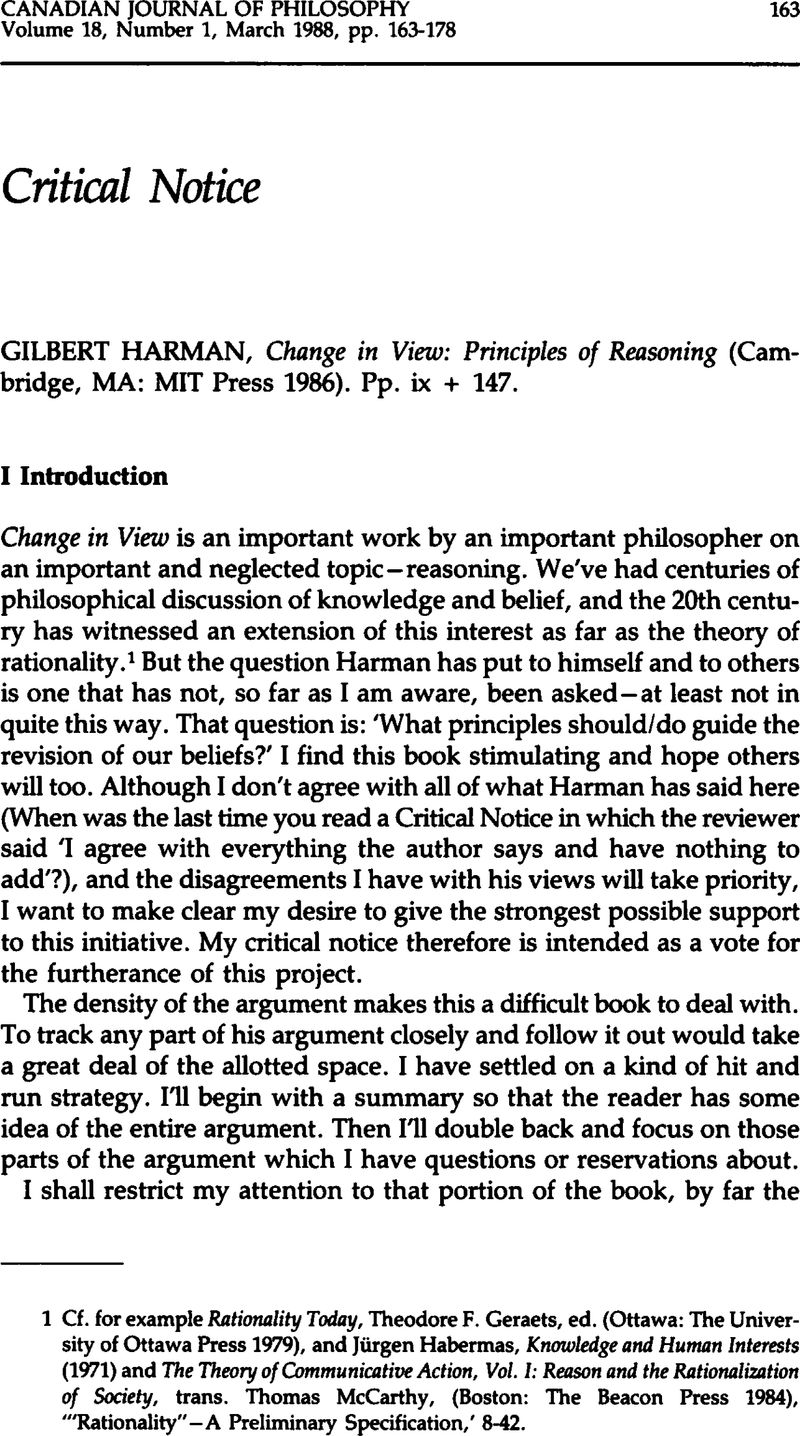No CrossRef data available.
Article contents
Gilbert Harman Change in View: Principles of Reasoning (Cambridge, MA: MIT Press 1986). Pp. ix + 147.
Review products
Published online by Cambridge University Press: 01 January 2020
Abstract

- Type
- Critical Notice
- Information
- Copyright
- Copyright © The Authors 1988
References
1 Cf. for example Rationality Today, Theodore F. Geraets, ed. (Ottawa: The University of Ottawa Press 1979), and Habermas, Jürgen Knowledge and Human Interests (1971) and The Theory of Communicative Action, Vol. 1: Reason and the Rationalization of Society, trans. McCarthy, Thomas (Boston: The Beacon Press 1984), ‘“Rationality”-A Preliminary Specification,’ 8–42Google Scholar.
2 For those interested in making contact with recent research in psychology which has a bearing on reasoning, I recommend Nisbett, Richard and Ross, Lee Human Inference: Strategies and Shortcomings of Social Judgment (Englewood Cliffs, NJ: Prentice-Hall 1980)Google Scholar and Kahneman, Daniel Slovic, Paul and Tversky, Amos Judgment under Uncertainty (Cambridge: Cambridge University Press 1982)CrossRefGoogle Scholar.
3 I add this qualifier because of the challenge to ‘folk psychology’ from such quarters as Stephen Stich's From Folk Psychology to Cognitive Science (Cambridge, MA: The MIT Press 1983).
4 Throughout I shall follow the practice of abbreviating the proposed or putative principles and placing them in square brackets.
5 For a review of recent developments in this area, cf. Johnson, Ralph H. and Blair, J. Anthony ‘Informal Logic: The Past Five Years 1978-83,’ American Philosophical Quarterly 22 (1985), 181–96Google Scholar.
6 Moore, G.E. ‘A Defence of Common Sense,’ in Philosophical Papers (New York: Collier Books 1962) 44Google Scholar: ‘We are all, I think, in this strange position that we do know many things, with regard to which we know further that we must have had evidence for them, and yet we do not know how we know them, i.e. we do not know what the evidence was.’
7 Philosophical Investigations, #593
8 I have a host of layman's questions: Is the Karen example a good one? Is it the case that we are like Karen, and find it hard to give up our original belief even after we are shown that the basis was fiction? How do we know that this is the proper or the best interpretation of Karen's situation? How have experimenters gone about imposing appropriate controls to rule out other possibilities? Suppose Karen retains her belief because she believes that the experimenter is, in the debriefing session, not telling the truth; perhaps he is fidgety and she construes that as a body language indicative of dissemblers, etc.
9 For an elaboration of this doctrine, cf. Johnson, Ralph H. and Blair, J. Anthony Logical Self-Defense 2nd ed. (Toronto: McGraw-Hill Ryerson 1983), 29–53Google Scholar, and Govier, Trudy A Practical Study of Argument (Belmont, CA: Wadsworth 1984), 60–4Google Scholar.
10 By dialectical here I mean to refer to those factors which must be attended to insofar as an argument is part of an exchange. The standard context for an argument then is the dialogue. And in saying that argument must be conceived dialectically I mean that it must not be forgotten that argumentation is a human practice involving an interchange between at least two roles, if not two participants.
11 It seems that (PCA) as a regulative principle of reasoning is consonant with what psychologists have discovered to be an important principle in the everyday reasoner's approach to his task: ‘Reduce cognitive load.’ cf. Perkins, David Allen, Richard and Hafner, James ‘Difficulties in Everyday Reasoning,’ in Thinking: The Expanding Frontier, Maxwell, W. ed. (Philadelphia, PA: The Franklin Institute Press 1983), 186–7Google Scholar.
12 The move Harman resists here is parallel to one which occurs in informal logic, where some would have argued that all arguments are really deductive in nature (‘deductive chauvinism,’ to use Prof. Merilee Salmon's apt phrase), while others think that all arguments at least ought to be treated as though they were for purposes of reconstruction and criticism. I have never seen a convincing argument for either position. The strategy behind both moves is something like this: if you can convert A to B by some process, then A really is a B. Thus, if you can convert an apparent explanation into a deductive implicature, then it really was an implicature all along. If you can convert an inductive argument into a deductive one, then it really was a deductive argument all along. I think this view is mistaken but cannot argue for that claim here.




